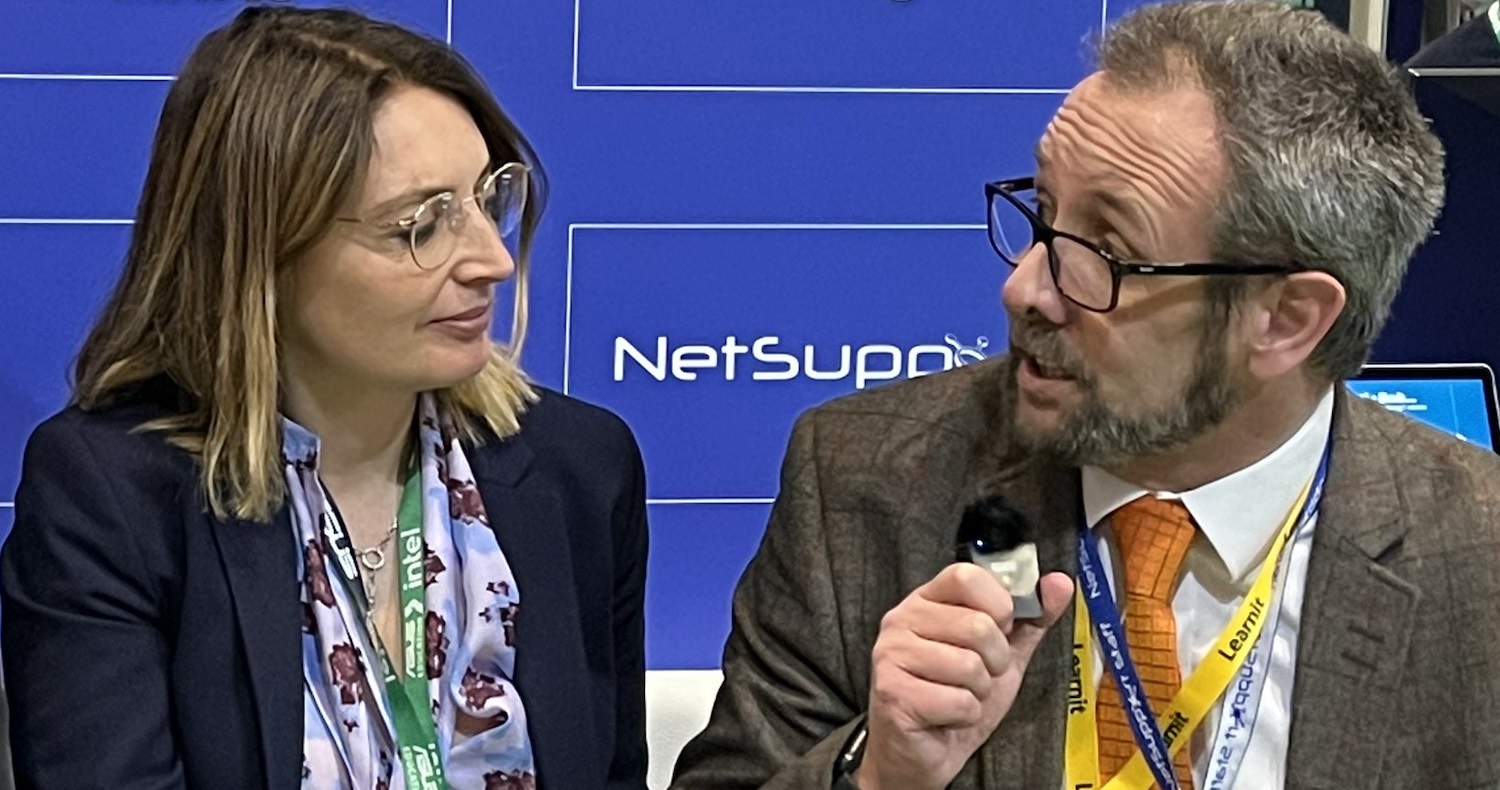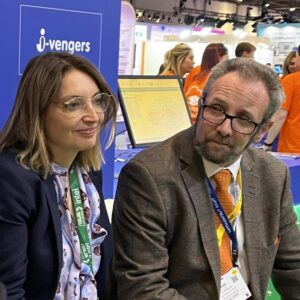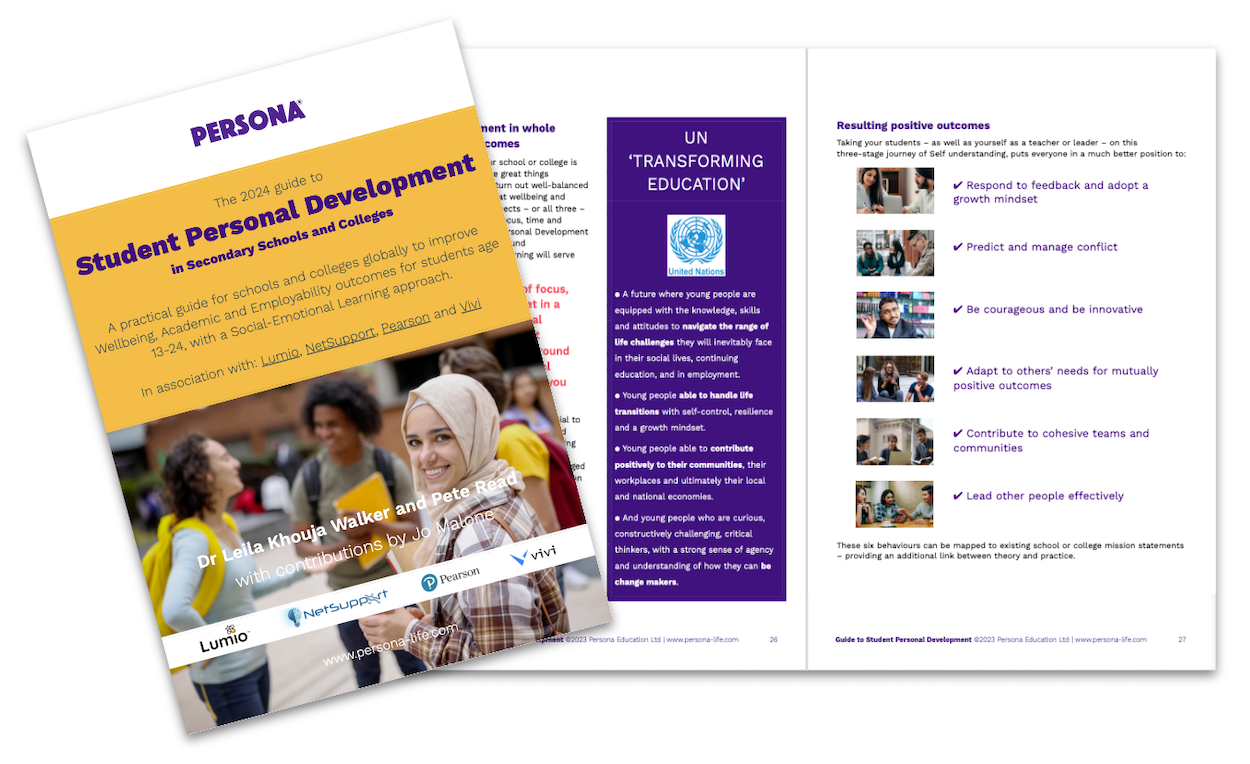EdTech influencer Al Kingsley talks to Persona Education co-founder Dr Leila Khouja Walker

When Persona Education co-founder Dr Leila Khouja Walker appeared as a guest on edtech influencer Al Kingsley’s NetSupport Radio, a wonderful conversation flowed between two educators who share a passion for evidence-based edtech solutions designed to amplify teaching and learning outcomes.
2-Jul-22
The full NetSupport Radio interview is available to listen to here
Al Kingsley (AK): Can you tell us about the research you’re working on?
Dr Leila Khouja Walker (LKW): In 2019, I set about trying to understand why our teens are struggling so much with their wellbeing and what solutions, backed by research, might help to buck the downward trend from age 8 to 18, as reported by SchoolDash and others in the UK, and the OECD on a global level. Much of the research was pointing to poor life skills such as communication, resilience and problem-solving.
So you might ask, why does wellbeing appear to be particularly bad during teen years? Well, I think it’s pretty common knowledge that teen years are not the easiest to navigate – lots of change occurring both biologically and psychologically as they move from childhood to adulthood. But secondary education did not seem to be doing anything, at scale, to address this. Lots of talk with some outstanding examples of schools adopting life skills development programmes and wellbeing measures at the heart of their curriculum delivery – but that certainly wasn’t the norm. You might see some extracurricular activities on the timetable and the introduction of mental health counsellors had begun, but not much in terms of seeing significant and regular delivery of wellbeing for every young person – not just when they find themselves in crisis.
And how odd is that? Considering there is a library worth of research to show that wellbeing is a critical precursor to academic success, employability and much much more.
 .
.
AK: How does this research feed into the work you do at Persona Life Skills?
LKW: We gathered the empirical research I’ve already described, to build our theory of change. The change we seek is to increase wellbeing amongst young people through developing life skills. Our unique proposition is where we start the user journey to make this desired change. We have developed a tech-enabled personality insights framework to enable young people to better understand their ‘self’, as well as other people.
This insight supports deeper and accelerated learning of the social-emotional life skills that have been shown to improve wellbeing. Research from social psychologists such as Bandura advocated this as far back as the ’90s. But we can even go further back to 300 BC and Aristotle, who declared “Knowing yourself is the beginning of all wisdom.”
Think about it! How can you properly understand respect and empathy if you have no understanding of who you are first? And what that means from a personality perspective includes considering how others see and hear us, not just how we see ourselves. Sometimes this may surprise us, as our intention does not always match how others perceive us. We may then decide to adapt and do things differently knowing this, so we can achieve better outcomes.
Once students have gained a better understanding of who they are and how they think, communicate and behave, we start to develop their Life Skills – up to 22 of them across six Skillsets – through a series of learning modules, purposely contextualised to match age-appropriate life challenges for teenagers.
The final part of our theory of change is providing students with opportunities to apply their Life Skills in a range of scenarios.
An important distinction we make is in our definition of wellbeing. Our metrics enable students to self report against three different wellbeing contexts: Social, Learning and Work. We do this as it is common for students to ‘appear’ very differently in each context.
 .
.
AK: “What about the role of technology in Persona Life Skills?”
LKW: We have purposely adopted Mishra and Koehler’s 2006 TPACK framework to develop our online platform, Personal Life Skills. Simply put, TPACK reminds us that our first stage of development should consider Content Knowledge, followed by Pedagogical Knowledge, and only then Technical Knowledge. In other words, tech is only considered once content and pedagogical considerations have been made.
Our personality insights framework acts as the initial Content Knowledge driver to inform the Pedagogical Knowledge required to transform knowledge of personality insights into the acquisition and application of social-emotional life skills.
Broken down, this user journey can be seen to comprise small steps towards gaining Content Knowledge, with Pedagogical Knowledge acting as the stepping stones to facilitate the journey. These stepping stones are informed by three strongly evidence-based pedagogical methods for supporting effective learning: flipped learning, cooperative learning and imagined contact.
Then we come to the technology, and consider how it may facilitate the content and pedagogical knowledge we have chosen. The need to provide schools with teaching and learning journeys online is a given in the post-pandemic world. With this in mind, Persona Life Skills was created as an online learning platform that provides easy personalised access for teachers and students.
The application of a probability density function algorithm enables a detailed and nuanced analysis of any individual’s mix of personality styles, based on their responses to questions presented in the platform.
AK: How do students benefit from your framework?
LKW: Social contact is the number one topic of interest for most teenagers, including relationships with friends, teachers, classmates, parents, siblings, sports teammates and more. These all have a huge impact on wellbeing too, and they all depend heavily upon effective communication and appropriate behaviour in different situations.
Developing an awareness and understanding of their own mix of personality styles, and other people’s, helps young people to improve the Life Skills that can make or break the success of their relationships.
Learning to recognise and use our six Skillsets is a route to the conscious adaptability that can help teenagers to achieve positive outcomes in relationships of all kinds, from friendship groups to getting along with teachers, as well as short but important interactions when they are older such as job interviews.
The Persona thinking framework, our personality styles concept, offers young people an approach they can use to develop, accelerate and deepen their learning and application of social-emotional Life Skills.
But let me share some more stats! Current research stats show significant positive impacts on wellbeing through Life Skills acquisition, such as, a significant reduction in student depression and anti-social behaviour by as much as 50%, 10% to 20% higher academic attainment at GCSE, and 34% less job-hopping – demonstrating better career choices and ability to adapt within roles.
 .
.
AK: How can schools sign up?
LKW: If any of your listeners wish to sign up for a free school account with access for unlimited teachers and students, they can register at www.persona-life.com. The schools will then have a 90 day trial with access to most of the Persona Life Skills web app before choosing whether to continue on a free account with limited access to content and features, or move to a paid subscription and enjoy the full benefits of Persona Life Skills.
Persona Education offers free access to its Persona Life Skills online learning platform for secondary schools and colleges interested in developing their pupils’ social-emotional life skills, to boost wellbeing and employability.




